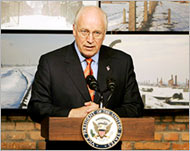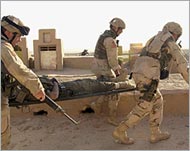Time to withdraw US troops from Iraq?
More than two years after the US invasion of Iraq, President George Bush is used to rebutting criticism from liberal Democrats over his administration’s strategy for rebuilding the country.

In the political battleground of Washington DC, such attacks are often dismissed as partisan gamesmanship.
The same cannot be said, however, for a recent congressional resolution calling on Bush to set a timetable for a partial withdrawal of US troops from Iraq.
The proposal did not come from one of the president’s political enemies, but from Representative Walter Jones Jr, a Republican congressman from North Carolina.
Jones, who gained notoriety for insisting that cafeterias in the House of Representatives change the name “French fries” to “freedom fries”, ignited a minor political storm by publicly challenging the Bush administration’s failure to outline a definitive exit strategy.
Ironically, Jones, who strongly supported the 2003 Iraq war resolution, has rejuvenated a near dormant debate over when and how to bring at least some US troops home now that an interim Iraqi government is in place.
“We cannot forever be depended upon as the primary defence force in Iraq, nor can we compromise the ability of our armed forces to adequately respond to the other emerging threats that endanger America,” Jones said in a statement announcing the non-binding resolution.
Timetable demanded
Democratic Senator Russ Feingold recently proposed a similar measure.
“Having a timetable for the transfer of sovereignty and having a timetable for Iraqi elections have resulted in real political and strategic advantages for the US,” Feingold said in a press release. “Having a timetable for the withdrawal of troops should be no different.”
 |
|
US politicians are once again |
Until now, Bush has been able to “avoid much discussion of his Iraq strategy”, said Gideon Rose, managing editor of Foreign Affairs, a bi-monthly journal published by the Council on Foreign Relations.
“What Jones’s bill shows is that now the status quo of Iraq policy is starting to come under fire,” he told Aljazeera.net.
While experts say most Americans still believe the military should remain in Iraq until some type of democratic stability is achieved, 59% support the withdrawal of at least some US troops, according to the most recent Gallup poll.
“I would say it is steadily increasing – the number of people who want the troops withdrawn,” Carroll Doherty, associate director of the Pew Research Centre for People and the Press, says.
Doherty said the ongoing cycle of violence and the fact that people do not think things are getting any better, were driving down public support for an indefinite US military commitment in Iraq.
Getting out
Jonathan Hoger, a Republican voter from Bethesda, Maryland, said although he still supports the Bush administration’s agenda in Iraq, he believes it may be time to let the Iraqi security services bear the brunt of the fighting.
“I just think we’ve done all we can to give the Iraqi people a new start,” Hoger says. “We got rid of Saddam and helped them elect a new government. Now I think it’s time for us to think about getting out.”
 |
|
Iraqi security forces have been |
Many Americans, however, say they fear the potential ramifications of withdrawing from Iraq before the insurgency is quelled, something they believe could generate more chaos in the region.
“Whether I supported the war in the first place is irrelevant at this point,” said Tim Sherwood, a Democrat from Washington, DC. “I think most reasonable people understand that cutting and running too soon would only make the situation worse.”
With some people pondering where the so-called tipping point in public opinion on Iraq may lie, one polling expert said Iraqi attitudes will be a major factor in determining how long Americans support the US military presence.
Republican defections?
The American public will call for an exit from Iraq “if they come to the conclusion that a majority of Iraqis want us to get out … that we’re only provoking more resistance by being there,” Stephen Kull, director of the Centre for Policy Attitudes, a nonpartisan polling organisation, told Aljazeera.net.
 |
|
Republicans are starting to |
In the meantime, the Bush team must work to prevent any more defections within the Republican party. While congressional support for Iraq remains strong, some political analysts said the Jones resolution could signal a potential “break in the dike” if additional members stray from the fold.
“Jones is isolated in terms of [a Republican member of Congress] being willing to go public with his criticism, but I don’t think he is isolated in terms of his underlying feelings,” Rose says.
Despite Vice-President Dick Cheney’s recent assertion that the resistance in Iraq is in its last throes, several Republican lawmakers have challenged such optimistic statements.
Getting worse
“Things aren’t getting better; they’re getting worse. The White House is completely disconnected from reality,” Republican Senator Chuck Hagel recently told US News and World Report.
 |
|
The rising US toll damages Bush’s |
“It’s like they are just making it up as they go along. The reality is that we’re losing in Iraq.”
Bush dismissed any possibility of an early US troop withdrawal in his weekly radio address, calling the war in Iraq a critical front in the war on terrorism.
“By making their stand in Iraq, the terrorists have made Iraq a vital test for the future security of our country and the free world,” Bush said.
However, with more than 1724 US troops already dead, the administration will have to demonstrate some tangible signs of progress if it expects to keep American forces in place for the long haul, Rose says.
“[Bush] won’t be able to sustain a policy permanently in the face of public opinion that goes the other way,” he said.